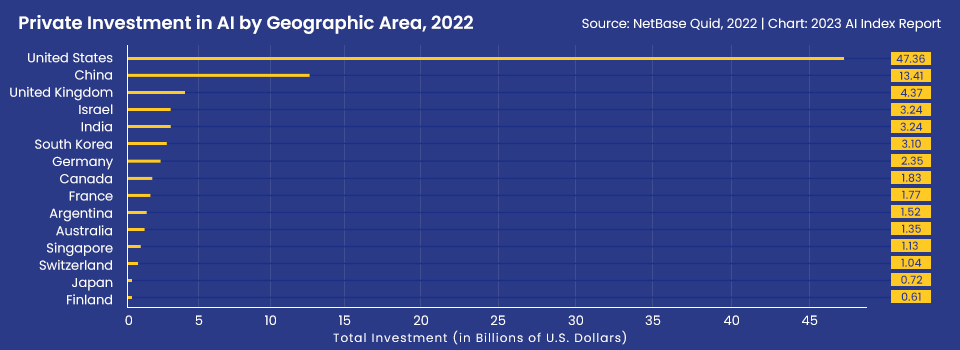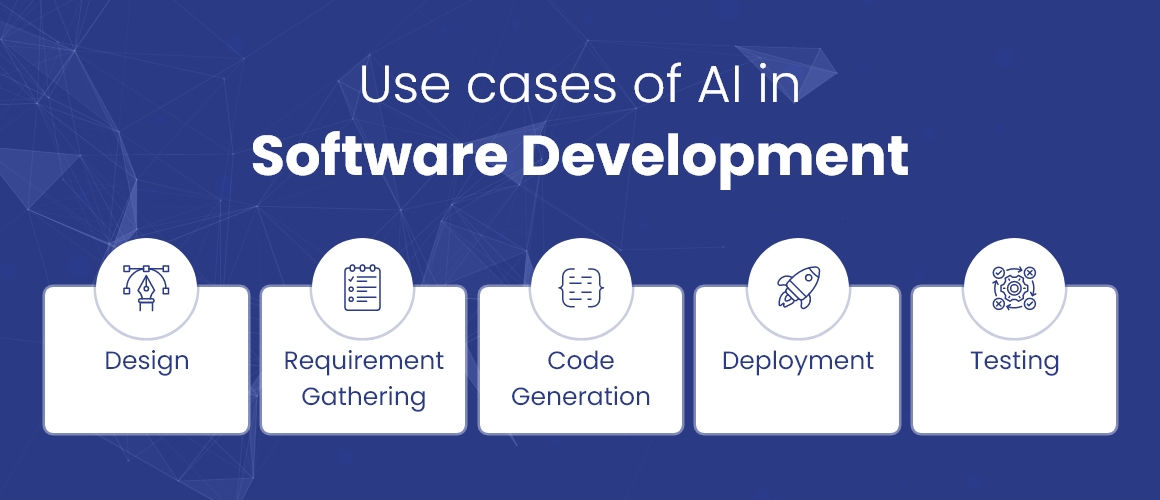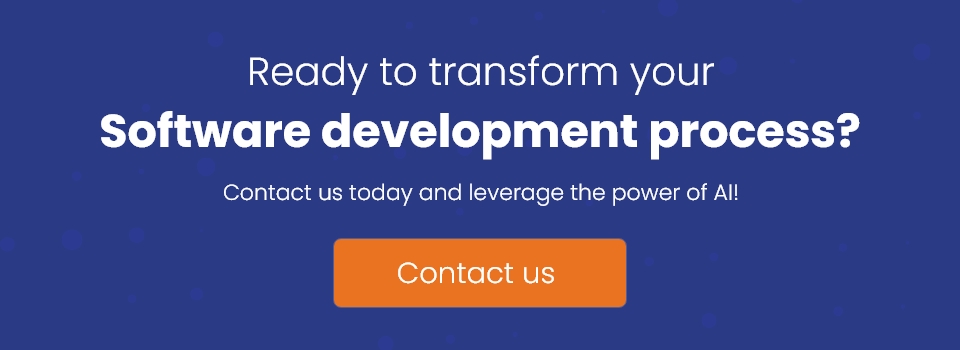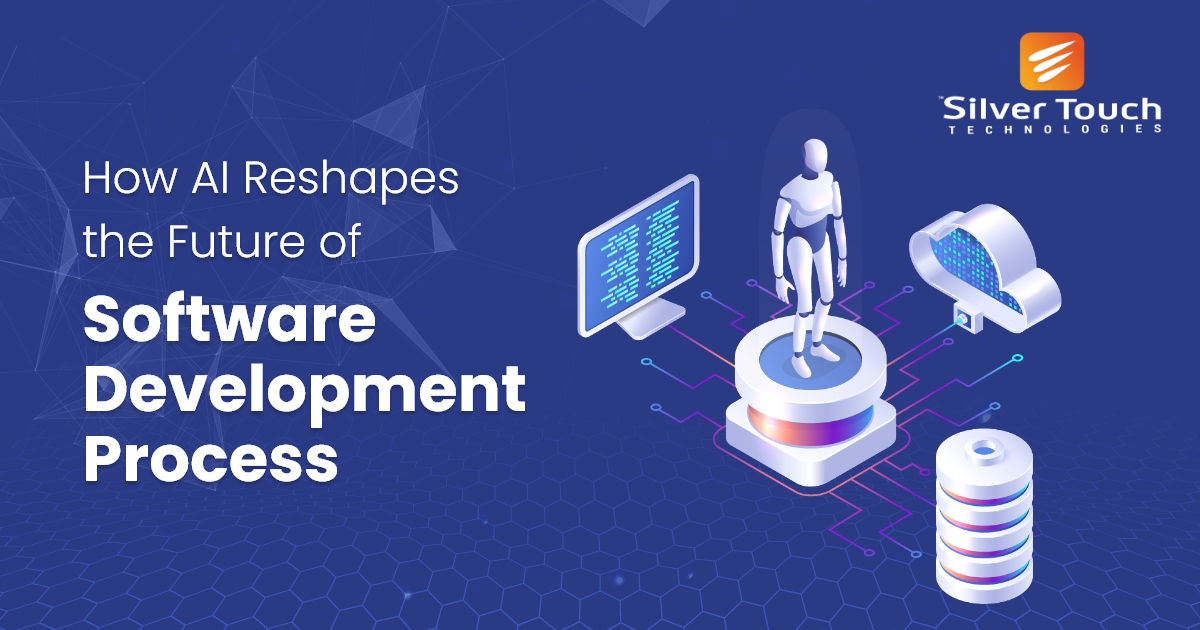Artificial Intelligence can bring remarkable advancements and increase efficiency in software development. AI and software development combine to automate repetitive tasks and streamline various processes. Developers can get intelligent assistance throughout the process and manage various tasks more efficiently.
In this article, we will understand the role of AI in software development through various use cases. We will also dig deep into the benefits and challenges of AI and software development combination.
Let’s start from scratch and understand the importance of combining AI with software development.
Understanding AI and Software Development
AI has already penetrated software development. Though many software developers hesitate to depend on AI for writing code, this technology is useful for analyzing code. A Forrester survey has revealed that AI can improve agile test automation and overall process in software development. AI-powered tools can make software development more convenient and quicker for developers.

As per the Stanford University report, the US remained at the top of the list of private investments in AI, with over 47 billion USD. In other words, geographically, the USA invested heavily in AI for good reasons. It is fair to mention that AI can reshape the future of software development by automating mundane tasks and enabling tools or machines to make decisions.
Let’s understand the importance of AI in software development through an example-
Manual testing of custom software is a time-consuming process and requires a lot of effort from developers. AI-driven test automation can reduce this time significantly while enhancing reliability. Also, developers can get more time to focus on other productive tasks.
Software developers assist entrepreneurs to leverage the benefits of artificial intelligence. Here we mention some of the promising outcomes or benefits of AI in software development along with use cases.
Benefits of using AI in Software Development
AI has a great impact on software development and we can expect that the potential of AI will benefit various industry sectors through advanced software.
Improved Security
This is one of the biggest benefits of integrating AI in software development. The business system usually collects data from various sensors and software installed. AI can enable companies to investigate the collected data with the help of machine learning. It also enhances data security by addressing issues like false notifications and warnings.
Enhanced Decision-making
AI, ML, deep learning, and business rules can improve the decision-making process significantly. ML (Machine Learning) solutions can make decisions based on past development projects and the situation of current projects. AI technologies assist developers to build better software in a relatively short time by enhancing the decision-making process.
Early Detection
A software development company wants to identify bugs and errors as early as possible. Thanks to AI tools, developers can improve coding and get rid of examining the executable files that have bugs and errors. In a way, early detection of such bugs becomes easier for them.
Increased Accuracy
AI can analyze historical data related to earlier projects of any enterprise and find out correlations. It also assists software developers to get accurate estimates for the entire process. Predictive analytics can assist software development companies to find out business rules for software along with accurate estimation of cost, effort, and development duration.
Use cases of AI in Software Development

AI can play a vital role in various aspects of software development. Some of these areas include code generation, testing, and design. Let’s understand some of the key applications of AI in the development process.
Design
Planning and designing are two key aspects to handle before initiating development. Designers need to come up with a proper design for each stage, and it becomes an error-prone task for them. Here, AIDA (Artificial Intelligence Design Assistant) and other tools can facilitate designers to understand the requirements and keep their designs free from errors. AIDA platform can examine different combinations of software design and give a proper design.
Requirement Gathering
In the initial phase of SDLC (Software Development Life Cycle), requirement gathering needs the maximum attention. This phase also takes a lot of time and effort for developers and other stakeholders along with the clients. Here, Google ML Kit and other AI tools can automate certain basic processes to reduce human intervention. NLP also makes machines understand the user’s requirements and derives proper models.
Code Generation
One of the most popular applications of AI technology in software development is automatic code generation. When it comes to writing code for a huge project, developers find it time-consuming and daunting. AI can accurately handle this task by offering intelligence programming assistance. Developers can take assistance from NLP and other AI tools in code generation.
Deployment
AI technologies can increase the efficiency of various activities related to deployment control. The deployment phase is crucial for any software development company and if its developers fail to execute the process, there will be larger consequences. AI can facilitate developers to stay away from vulnerabilities during the deployment and upgradation processes. In other words, AI can reduce the risk of error or failure in deployment.
Testing
This phase is crucial to ensure the product’s quality. However, repetition of this process every time whenever you change the source code can be time-consuming and pricey. Here, AI software testing can lend a helping hand. AI-based tools can perform regression testing effectively and automate the testing process to save time and effort. Also, you can expect more accuracy in AI-powered testing.
Challenges in AI and Software Development Collaboration
Though AI looks like a game changer in software development, developers have to overcome some challenges related to this collaboration.
Let’s make a list of such challenges.
Bias
AI algorithms can handle diverse data, but as they have been trained on large datasets, they may sometimes show bias for some sort of data. This can bring biased recommendations in software development.
Ethics
Ethical implications can remain one of the major challenges of AI and software development combination. Sometimes, AI-based algorithms can make decisions or generate code that can create concerns like bias, accountability, and fairness.
Expertise
Though AI brings automation, human intervention is necessary for decision-making and critical thinking. The software development domain can face these challenges with the help of expert professionals with domain insights and problem-solving skills.
Best Practices for AI and Software Development Collaboration
Companies can overcome these challenges by following the best practices for AI and software development combination. Here are the standard practices to make the most of this collaboration.
- Keeping diverse and representative data for training of AI algorithms
- Incorporating specific considerations in the development and integration of AI-powered tools for ensuring fairness and transparency
- Offering real-time training to software developers and stakeholders to keep them updated with AI advancements and ethical practices
- Ensuring a smooth collaboration between AI and human developers for a better decision-making process
The development company can gain the advantage of AI technology and minimize the impact of challenges by following these standard practices.
Future of AI and Software Development Collaboration
AI has a promising future as its adoption rate in various industries continuously increases. Technology is rapidly evolving, and advancements like NLP, deep learning, and ML have significant potential in software development. We can expect the advent of highly sophisticated AI-powered tools in the future that can understand complex code and make more meaningful decisions. AI-powered tools will also assist in higher tasks like system optimization and design.
Recently launched GPT-4 has indicated the capability of AI tools and made waves globally. New opportunities will come through more powerful AI tools in the future.

Conclusion
AI is all set to play a pivotal role in transforming software development. It’s time to embrace its potential for bringing speed and innovation. As the corporate world deals with new challenges and increasing competition, AI has brought a ray of hope and innovation in the enterprise software domain.
As a renowned and reliable software development company, Silver Touch Technologies offers excellent AI consulting and other services to ensure that you can get a seamless IT solution for your company. If you wish to hire software developers or know more about our range of services, we’re just an email away! Send us your query at info@silvertouch.com and one of our business experts will get back to you with a customized solution.
FAQs on AI in Software Development Process
How is AI changing the software development process?
AI is changing the software development process in a number of ways. For example, AI can be used to: Automate tasks such as code generation, testing, and deployment. Improve the quality of software by identifying and fixing bugs more quickly. Generate new ideas and insights for software development. Help developers to collaborate more effectively.
What are the benefits of using AI in software development?
The benefits of using AI in software development include: Increased productivity: AI can automate tasks that would otherwise be done by humans, freeing up developers to focus on more creative and strategic work. Improved quality: AI can identify and fix bugs more quickly, leading to higher quality software. New and innovative products: AI can be used to create new and innovative software products that would not be possible without AI.
What are the challenges of using AI in software development?
The challenges of using AI in software development include: Cost: AI can be expensive to implement and maintain. Expertise: AI requires specialized expertise to use effectively. Data: AI requires large amounts of data to train and operate. Bias: AI algorithms can be biased, which can lead to discrimination. Ethics: The use of AI in software development raises a number of ethical concerns, such as privacy and the potential for job displacement.
What are the future trends for AI in software development?
The future trends for AI in software development include: Increased use of AI-powered tools and services. Development of more sophisticated AI algorithms that can understand complex code and make more meaningful decisions. Increased collaboration between AI and human developers. The emergence of new ethical challenges related to the use of AI in software development.
What are some of the ethical considerations of using AI in software development?
The use of AI in software development raises a number of ethical concerns, such as: Privacy: AI algorithms can be used to collect and analyze personal data, which raises privacy concerns. Discrimination: AI algorithms can be biased, which can lead to discrimination. Job displacement: AI-powered tools and services could displace some software developers. Safety: AI-powered systems could be used to create autonomous systems that could pose safety risks. It is important to be aware of these ethical considerations and to take steps to mitigate them when using AI in software development.
